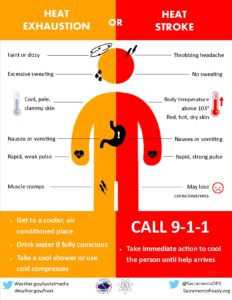
For the past few weeks, it seems that every time I leave my apartment I am hit with a wave of stuffy hot air. I find myself desperately hoping for a cool breeze but instead usually get more heat. I’m not alone; as the United States has been gripped by a substantial heat wave, with temperatures well above 90 degrees throughout much of the country. Temperatures in big cities like New York City and Washington D.C. hovered around 100 °F, while parts of the Southwest United States hit temperatures up to 108 °F! Heat waves are at the very least uncomfortable, and might cost you a higher-than-normal electricity bill but they can also come with deadly consequences.
There are a few types of heat-associated injuries, but the most serious of these include heat exhaustion, heat injury, and heat stroke. Heat exhaustion is when the body overheats (generally to 101 and 104 °F), and the heart cannot pump hard enough to keep up with the body’s demand. People with heat exhaustion are dehydrated, sweaty, weak, lightheaded, crampy, and often have a fast heart rate and low blood pressure. Heat injury is similar. This is when the body overheats (often to 104 °F and higher), and the body’s organs are damaged. Finally, heat stroke is the most serious heat-associated injury. This is when the body heats to over 104 degrees with the possibility of organ damage, muscle damage, confusion, coma, and even seizure.

Heat-associated injuries can be frightening and deadly. It is important to recognize them early and intervene when possible. There are certain individuals at particularly high risk for heat-associated injuries. Elderly individuals are at risk, as well as individuals who cannot always escape the stifling heat (such as people who are homeless). Those who do physical jobs or exercise outside, such as construction workers and athletes, are also at risk of heat-associated injuries. Staying hydrated, taking intermittent breaks from physical activity, and taking the time to cool-off during the day are all important in preventing heat-associated injuries.
If somebody around you begins to become overheated, the best thing you can do is rapidly cool them off and seek medical help. While awaiting professional medical help you can get ice-water soaked towels and place them all over the person’s body or douse the patient in cold water to help. Heat injuries are scary, but the earlier that they are recognized, the less harm they will cause! Hopefully this heat wave subsides, and all of us can cool off a bit this summer.
*The views and opinions expressed herein are those of the author and do not necessarily reflect the views of MDLingo.com, its affiliates, or its employees.